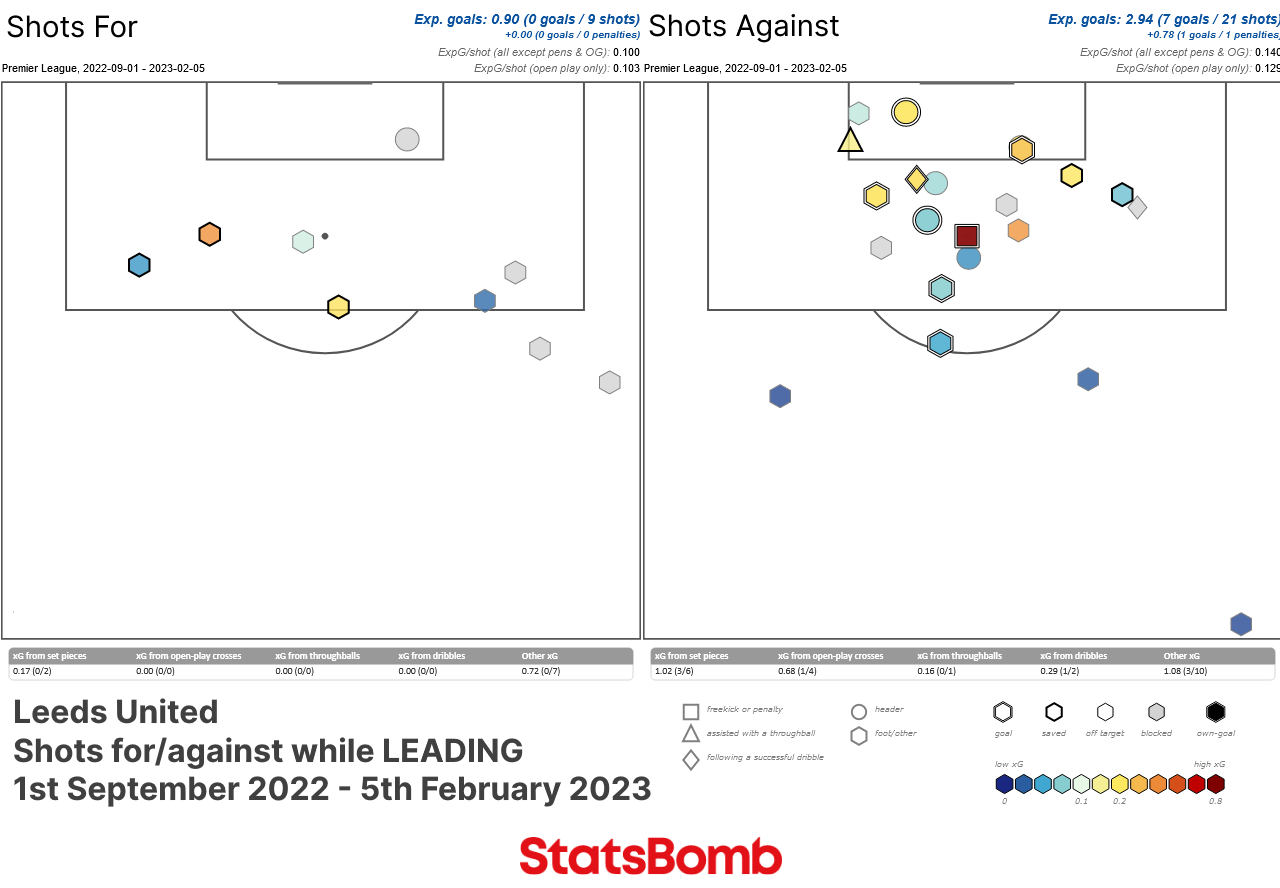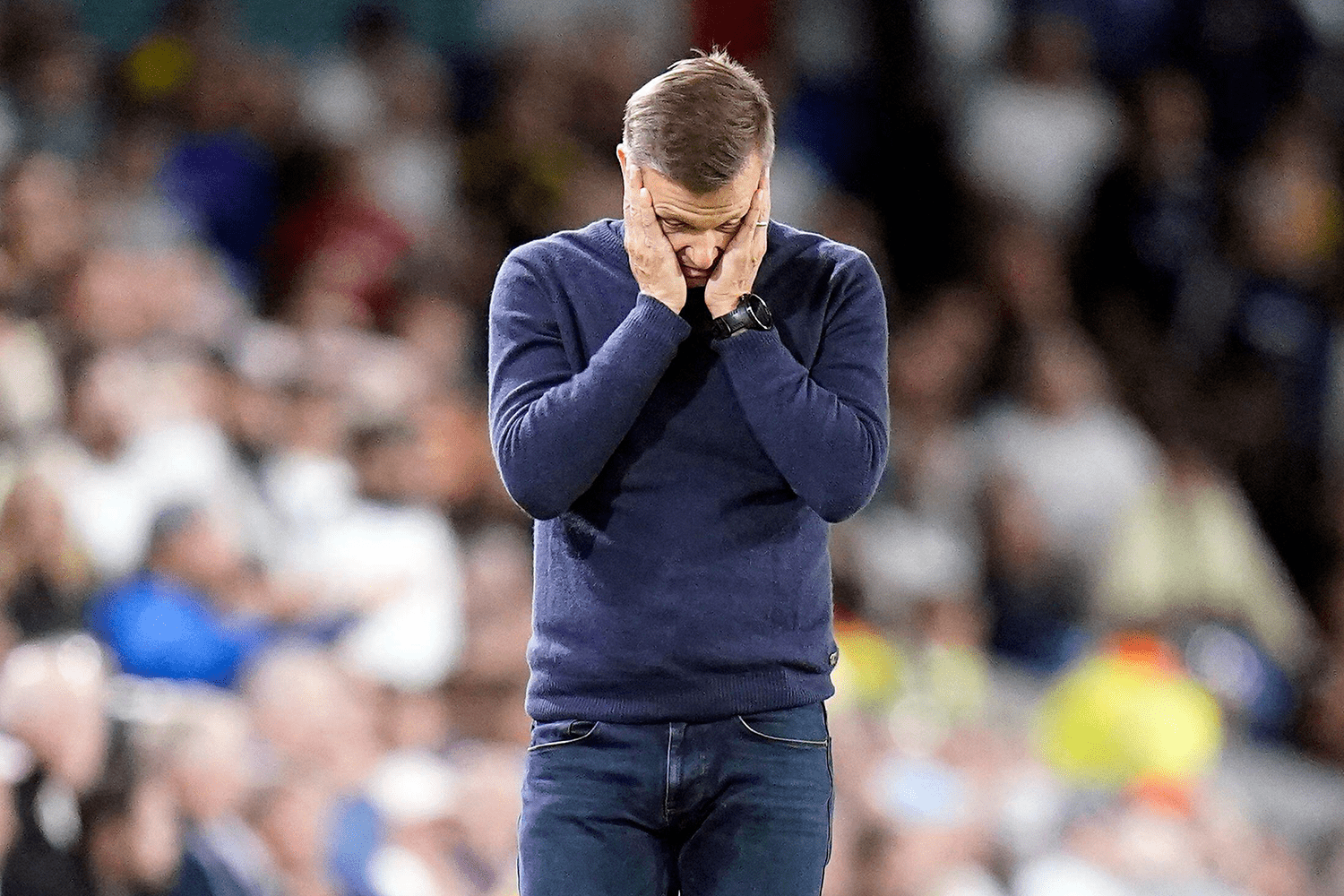It has been a difficult season for Leeds United. They started the season well with seven points from three games in August but since then have only picked up two victories in 18 Premier League games. This struggle to acquire points finally saw Jesse Marsch lose his job with the team in seventeenth place, and a genuine risk of relegation. Altogether the pressure increased, and now Leeds embark on a new journey under a year on from Marcelo Bielsa's departure.
One of the narratives that has seen some play is the idea that via metrics, in particular expected goals, Leeds have been unfortunate to struggle quite as much as they have. In contrast, there appears to be a strong fan view that the style of play and an inability to extract consistent performances from an expensively assembled squad has not been a good reflection on the manager's tenure. This divergence in view appears to be stoking passionate debate in the broader world and does bear some investigation.
Who is correct? As a numbers aficionado who doesn't watch Leeds very often, I quite like the look of their numbers! Via xG, the team ranks 12th in the division, at a shade under par at -0.08 non-penalty xG per game. The team has basically taken as many shots as its opponents, and of a similar quality. This is often a reasonable blueprint for survival in any given league.
In general, their off ball playing style is unorthodox, at least in comparison to their league peers, with 27% of their opponent's pass receipts disrupted (ie. engaged within two seconds) a clear margin ahead of any other team in the league (next best, perhaps surprisingly... Chelsea 23%). That stylistic choice and an inability to extract positive returns, in particular against theoretically well-matched sides, has been a major bone of contention. And in a proverbial "results business", like many a manager gone before, the difference between expectation and reality has been too much for Marsch to survive. A small overshoot in attack of a couple of goals has been offset and more by around eight more conceded than might seem likely. In the words of my non-numbers aficionado brother-in-law, a die hard Leeds fan and watcher who has followed the team through thick and thin: "We had to change something."
However, this divergence between numbers and a strong fan view backed by results is not necessarily usual, and if we look a little deeper on the numbers side, we can find a couple of curious elements that have contributed to the team ending up in this position.
1. When Leeds have taken the lead... they often gave it away quickly
Leeds have taken the lead in 10 games this season.
Prior to last night's visit to Manchester United, in the period of time after they had initially taken the lead they took 17 shots for an xG of 2.24 (0.13 per shot) and allowed 26 shots with an xG of 3.23 (0.12 per shot). Not great, not altogether bad though. Unfortunately, they contrived to turn that attacking xG into just two goals (both in the August wins) and the 3.23 xG against turned into 8 goals against them, and in swift time, sometimes within the same game.
- Against Palace they led for 14 mins before conceding then later lost 2-1
- Against Fulham they led for 6 minutes before conceding then ultimately lost 3-2
- They beat Liverpool 2-1, but only with a stoppage time winner after earlier giving away a lead within 10 minutes
- They beat Bournemouth 4-3 with a stirring comeback from 3-1 down, but had earlier kept their 1-0 lead for just 4 minutes
- They gave the lead away 3 times against Tottenham, after holding leads for progressively shorter time spans of 17, 8 and 5 minutes, before succumbing to an even quicker winning goal 2 minutes after it got to 3-3
- Against West Ham they led for 23 minutes (across half time) before it became 1-1 and later clawed it back to 2-2.
What's the psychological effect of a fan watching all these games? "This team can't keep a lead!" And me chattering away about how it's highly likely that there's a significant dose of random variance involved, and that Leeds should not expect to allow eight goals from their next three xG while leading by a goal is the kind of thing that can easily fall on deaf ears.
And then they stopped even taking the lead: before last night, the West Ham game was the last league game in which they led and indeed the only one of the last six they had played. Overall, Leeds spent very little time in games ahead, and when they have taken a lead they've often found themselves level again in short order. A decent proportion of the reason behind this is misfortune: 40% of the shots, 40% of the xG... 20% of the goals. It's the most divergent record for any team with a one goal lead in the league.

2. When Leeds have gone behind... they've often gone further behind
As a struggling team, Leeds have spent a good bit of time in deficit and often followed a goal concession with more:
- a 5-2 defeat to Brentford saw them survive 13 minutes between 1-0 and 2-0, then later just one minute between 3-2 and 4-2
- a 2-0 defeat to Leicester saw 1-0 turn into 2-0 inside 19 minutes, and that was that
- a 3-2 defeat to Fulham saw 2-1 become 3-1 in 10 minutes
- a 4-3 win vs Bournemouth still saw 2-1 become 3-1 relatively quickly, 29 minutes, before the aforementioned stellar comeback
- a 3-1 defeat to Manchester City saw 1-0 become 2-0 in 6 minutes and 3-0 duly arrived 13 minutes later, but y'know Man City sometimes do that
In all the time played at minus a goal, Leeds have outshot their opponents 64-39 (they're trying!) with a smaller gap in xG, 5.8 to 4.6. Maths your way through that and it shows that in these situations Leeds are giving up higher value chances than they are taking (0.09 xG per shot for, 0.13 against). This profile is somewhat true to general expectation of game states. Much like the plus one scenario this is pretty much okay, arguably better, with a few demerits for that high xG per shot against. What it doesn't account for is the reality of how how a +1.2 positive xG differential here turned into four goals for and eight against. To use the parlance we did before: while down a goal Leeds have taken 62% of the shots for 55% of expected goals and scored... 33% of the goals.
For divergence between expected goals and actual goals and specific score differentials (-1, tied, +1 and so on), this is the biggest negative gap in the Premier League this season and it compounds the impact of the significant negative gap we saw at plus one. These are key game states: a lead that could be worth three points quickly vanishes and turns into one or zero, a chance too claw back a draw vanishes as a deficit doubles. Hard times. Not fun.
All this makes the Leeds experience this season tough to endure. This team has produced metrics that have given it hope of a better future - indeed few managers will have lost their job after four consecutive games allowing under one expected goal and a last match that saw them give up six shots - yet the inability to hold a lead or come back from a deficit with any reliability will have tested the soul of even the most devoted fan. If there is good news in all this, it's unlikely that these specifically painful skews will persist, and there are the makings of a successful unit somewhere within, it's just all too late for Marsch. You can empathise with both his plight and the board's reticence to act, while accepting that critiques of his stylistic choices will have been exacerbated by on-pitch returns.
Of course, the choice of next manager is crucial, and the choice of whether to persist with a high energy style or switch to something different could have hard to forecast and entirely variable effects on the ability of this team to produce consistent, decent metrics and / or results.
Against Manchester United, the team turned 1-0 into 2-0 for the first time in the league since August - it can be done! - before the lucrative three points turned back into one. This Premier League is competitive at the bottom though, and Leeds are at risk, but far from doomed.

